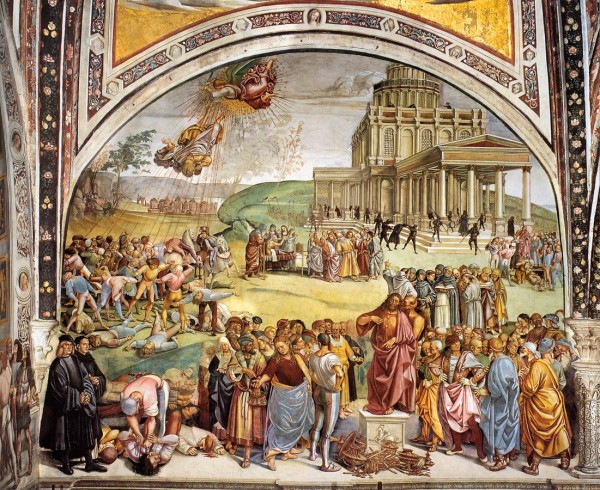Soloviev And Our Time (the Antichrist)
1 Μαΐου 2011

Sermon and Deeds of the Antichrist by Luca Signorelli, 1499-1502, fresco, Chapel of San Brizio, Duomo, Orvieto
By Giacomo Cardinal Biffi
Vladimir Sergeevic Soloviev passed away 110 years ago, on July 31 (August 13 according to our Gregorian calendar) of the year 1900. He passed away on the threshold of the 20th century — a century whose vicissitudes and troubles he had foreseen with striking clarity, but also a century, which, tragically, in its historical course and dominant ideologies, would reject his most profound and important teachings. His, therefore, was a teaching at once prophetic and largely unheeded.
A Prophetic Teaching
At the time of the great Russian philosopher, the general view — in keeping with the limitless optimism of the «belle epoque»‘ — foresaw a bright future for humanity in the new century: under the direction and inspiration of the new religion of progress and solidarity stripped of transcendent elements, humanity would enjoy an era of prosperity, peace, justice, security. In the «Excelsior» — a form of dance, which enjoyed an extraordinary success in the last years of the 19th century (and which later lent its name to countless theaters and hotels) — this new religion found its own liturgy, as it were. Victor Hugo proclaimed: «This century was great, the one coming will be happy.»
But Soloviev refused to allow himself to be swept up in this de-sacralized vision. On the contrary, he predicted with prophetic clarity all of the disasters which in fact occurred.
As early as 1882, in his «Second Discourse on Dostoevsky,» Soloviev foresaw — and condemned — the sterility and cruelty of the collectivist tyranny which a few years later would oppress Russia and mankind. «The world must not be saved by recourse to force.» Soloviev said. «One could imagine men toiling together toward some great end to which they would submit all of their own individual activity; but if this end is imposed on them, if it represents for them something fated and oppressive… then, even if this unity were to embrace all of mankind, universal brotherhood would not be the result, but only a giant anthill.» This «anthill» was later constructed through the obtuse and cruel ideology of Lenin and Stalin.
In his final work, The Three Dialogues and the Story of the Antichrist (finished on Easter Sunday 1900), one is struck by how clearly Soloviev foresaw that the 20th century would be «the epoch of great wars, civil strife and revolutions» All this, he said, would prepare the way for the disappearance of «the old structure of separate nations» and «almost everywhere the remains of the ancient monarchical institutions would disappear.» This would pave the way for a «United States of Europe.»
The accuracy of Soloviev’s vision of the great crisis that would strike Christianity at the end of the 20th century is astonishing.
He represents this crisis using the figure of the Antichrist. This fascinating personage will succeed in influencing and persuading almost everyone. It is not difficult to see in this figure of Soloviev the reflection, almost the incarnation, of the confused and ambiguous religiosity of our time.
The Antichrist will be a «convinced spiritualist» Soloviev says, an admirable philanthropist, a committed, active pacifist, a practicing vegetarian, a determined defender of animal rights.
He will also be, among other things, an expert exegete. His knowledge of the bible will even lead the theology faculty of Tubingen to award him an honorary doctorate. Above all, he will be a superb ecumenist, able to engage in dialogue «with words full of sweetness, wisdom and eloquence.»
He will not be hostile «in principle» to Christ. Indeed, he will appreciate Christ’s teaching. But he will reject the teaching that Christ is unique, and will deny that Christ is risen and alive today.
One sees here described — and condemned — a Christianity of «values,» of «openings,» of «dialogue,» a Christianity where it seems there is little room left for the person of the Son of God crucified for us and risen, little room for the actual event of salvation.
A scenario, I think, that should cause us to reflect…
A scenario in which the faith militant is reduced to humanitarian and generically cultural action, the Gospel message is located in an irenic encounter with all philosophies and all religions and the Church of God is transformed into an organization for social work.
Are we sure Soloviev did not foresee what has actually come to pass? Are we sure it is not precisely this that is the most perilous threat today facing the «holy nation» redeemed by the blood of Christ — the Church?
It is a disturbing question and one we must not avoid.





